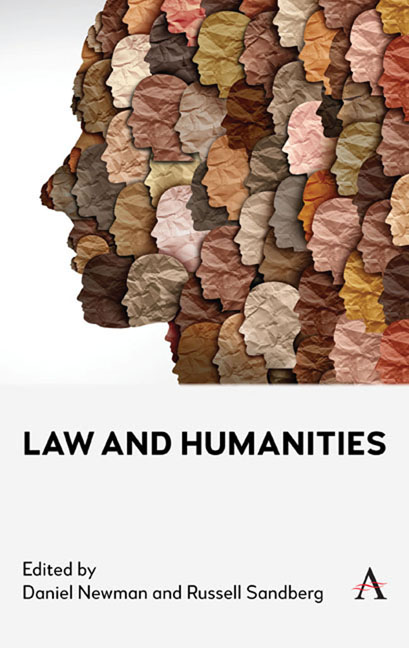Book contents
- Frontmatter
- Contents
- Preface
- List of Contributors
- Chapter One Introducing Law and Humanities
- Chapter Two Law and Archaeology
- Chapter Three Law and Comics/Graphic Justice
- Chapter Four Law and Film
- Chapter Five Law and Geography
- Chapter Six Law and History
- Chapter Seven Law and Literature
- Chapter Eight Law and Philosophy
- Chapter Nine Law and Popular Music
- Chapter Ten Law and Religion
- Chapter Eleven Law and Television
- Chapter Twelve Law and Theatre
- Chapter Thirteen Law and Theology
- Chapter Fourteen Law and Video Games
- Chapter Fifteen Conclusion: Subverting the Law and Humanities Canon
- Index
Chapter Thirteen - Law and Theology
Published online by Cambridge University Press: 27 March 2024
- Frontmatter
- Contents
- Preface
- List of Contributors
- Chapter One Introducing Law and Humanities
- Chapter Two Law and Archaeology
- Chapter Three Law and Comics/Graphic Justice
- Chapter Four Law and Film
- Chapter Five Law and Geography
- Chapter Six Law and History
- Chapter Seven Law and Literature
- Chapter Eight Law and Philosophy
- Chapter Nine Law and Popular Music
- Chapter Ten Law and Religion
- Chapter Eleven Law and Television
- Chapter Twelve Law and Theatre
- Chapter Thirteen Law and Theology
- Chapter Fourteen Law and Video Games
- Chapter Fifteen Conclusion: Subverting the Law and Humanities Canon
- Index
Summary
Introduction: Towards Legal Theology
In addition to the established field of law and religion whereby scholars study the interaction between religion and the law from a range of disciplinary perspectives, attention should also be afforded to the interaction between the disciplines of law and theology. Theology, the study of God, consists of a network of subdisciplines: in the Christian context, these include biblical theology, moral theology, ecumenical theology and so on. Each branch of theology has its own distinctive object of study, methods and purposes. For example, pneumatology studies the Holy Spirit, practical theology uses the pastoral cycle, and liberation theology seeks to transform unjust societal structures that oppress the marginalised. Each branch of theology has its own distinctive community of scholars. It is a common view (though perhaps a contested one, as between the different church traditions) that the main purpose of Christian theology is to proclaim the Gospel of Christ. The branches of theology, in turn, are vehicles for each of this core purpose.
This chapter explores how legal theology could become a branch of theology with its own distinctive objects of study, methods and purposes. What follows explores these themes, how the subdiscipline of legal theology might be defined and developed in the context of the study of the systems of law, order, and polity, of churches across the Christian traditions that deal with, for example, forms of regulation, ministry (lay or ordained), governance (institutions and functions), discipline, doctrine, worship, rites, property and external relations. It does so as to the following: (1) The object of study: legal theology should at its core be about the relationship between theology and church law – more particularly, the relationship between church law and each of the other branches of theology. (2) The method of study: legal theology may involve the theological study of church law and/or the legal study of theology using standard juristic methods (such as text and context, critical, historical, analytical) as well as methods used in the other branches of theology. (3) The purpose of study: the development of a community of scholars collaborating with a view to its impact on ecclesial practice. In each section, the potential for legal theology will be discussed by reference to three other subdisciplines of theology.
- Type
- Chapter
- Information
- Law and Humanities , pp. 201 - 208Publisher: Anthem PressPrint publication year: 2024

